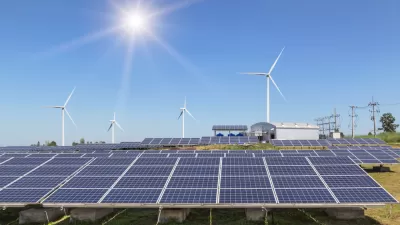I couldn’t wait to use the new word, ginormous, which Merriam-Webster recently added to the Collegiate Dictionary. My spell checker has been trained and now I can get about the business of saving ginormous amounts of energy. Recent bouts of ecoterrorism in the form of Hummer vandalism in Washington D.C. and the growing media attention to the environmental hypocrisy of the travel and housing habits of card-carrying carbon footprint club members (take a gander at the 10,000 sq. ft. home of Al Gore or the 28,200 sq.
I couldn't wait to use the new word, ginormous, which Merriam-Webster recently added to the Collegiate Dictionary. My spell checker has been trained and now I can get about the business of saving ginormous amounts of energy. Recent bouts of ecoterrorism in the form of Hummer vandalism in Washington D.C. and the growing media attention to the environmental hypocrisy of the travel and housing habits of card-carrying carbon footprint club members (take a gander at the 10,000 sq. ft. home of Al Gore or the 28,200 sq. ft., 102 acre, humble abode of John Edwards, or the larger jet Nancy Pelosi is flying these days) gave me a thirst for really doing something to reduce energy consumption.
So to help solve our energy and environmental problems I have put together a list of strategies that go beyond the typical planners' postulates that we need to stop sprawl, coordinate transportation and land use, and promote telecommuting, carpooling, walking and transit. For years we have researched and experimented, with arguably modest success at minimizing travel's energy and environmental consequences. Let's start thinking outside the big box and look at some other strategies. It's time to move beyond smart growth, transit oriented development and efforts at CBD boosterism. After all, if we are willing to plan, research, regulate, educate and cajole to try and influence urban land use and travel decisions why not apply those tactics to other promising areas. A number of new tactics for reducing transportation energy use deserve our serious attention.
Football is a ginormous American pastime but think of all the energy that is spent on Saturdays and Sundays traveling hither and yon in that big SUV, with the tailgating paraphernalia in the back, to watch your favorite team. First we should pass a regulation to make sure that the away team doesn't get any tickets for their fans. This would eliminate long distance travel for all those passionate alums and boosters who burn up Btu's chasing their team to the away games. Then, outlaw invitations to bowl games for teams from more that 75 miles from the stadium. Stop those TV blackouts so folks can just watch from home on their new high definition wall size screens (turn it off during commercials they draw about 500 watts). Require environmental impact statements for each new stadium to make sure those 15-event per year bemoths pass muster. Put a big tax on each player trade or ban free agency so the player's bond with the community and don't have family members and kids all over the country that they have to travel to see.
Assess a large transportation impact fee on divorces if couples have kids. Think of all the energy that gets spent traveling across town and across the country so divorced parents can spend time with Jessica and Travis who shuttle back and forth between mom and dad to match visitation schedules. The airports would be less crowded on holidays, shipping guilt-motivated gifts would reduce freight demand and dads could put a lot fewer miles on their inefficient, midlife-crisis, post-divorce sports cars or macho trucks.
Convert NASCAR to electric or hybrid vehicles and only allow fans and drivers to travel 75 miles from home to compete or watch. Imagine the savings and the public image value of this change. It would be safer too. The sponsor mix might have to change a little but all those folks traveling to Indianapolis, Daytona, Sebring, Talladega, etc. burn up ginormous amounts of energy. Think of these 75 mile travel restrictions as analogous to urban service or growth management boundaries.
Restrict fishing to shorelines and peers. Think of the waste pushing boats through the water in search of innocent fish. Even if you catch and release it wastes a lot of energy. Boat fuel use is often measured in gallons per mile not miles per gallon. And half those trucks and SUV's are purchased so folks can pull boats around. Using energy for boats and fishing has to be at least as bad as living in the exurbs and patronizing strip malls or Walmart, so we need to start regulating it more. Maybe sailboats and row boats would be okay. That 188 foot yacht actor Ron Perlman uses to entertain Hollywood elite goes through fossil fuel faster than Starbucks goes through coffee. The rich can just entertain at a resort on shore, no need for these yachts either.
Do away with exchange and return policies at stores and businesses. Think of the savings here. My wife alone would save a bundle of travel. This could spur reduced overall materialism not just fuel savings. I like this one.
All this talk about variable tolls and congestion pricing made me realize we need a new formula for gas taxes so we have a greener way to collect the green. We know the current average gas tax of approximately 54¢ per gallon is grossly inadequate to cover infrastructure costs and services say nothing of externalities; perhaps we should set the per gallon fuel tax at 1¢ times the number of gallons purchased squared times the number of filling station visits in the last 10 days. Try it and see how you come out.
This dispersion of family member across the country wastes huge amounts of energy. Visiting Grandma is just too energy intensive for way too many folks. We want to control sprawl in our urban areas, it seems only fair that we control regional and national sprawl as well. Who doesn't think all that movement of folks to places like Florida, Texas and California hasn't created ginormous amounts of family member and visitor travel? Maybe we help ameliorate this problem by eliminating inheritances for anyone who lives more than 75 miles from parents or siblings.
Switch to whiffle golf balls. Golf courses with 300-500 yard holes are the equivalent of big box stores. They are just too big and hard to fit near neighborhoods. We need neighborhood scale golf courses that we can walk to from home. None of these mega courses where people come from miles away to play. And let's get rid of this concept where we consider how many golf bags fit in the trunk as one criterion for buying a car. Let's get smaller sets and shorter clubs then we can get smaller cars.
Outlaw MySpace, Facebook, E-Harmony and Philanderers.com. These social networking sites ultimately create travel. Maybe we can build community front porches on all our public buildings so you can meet someone in the neighborhood and eliminate the prospect of long trips to socialize with someone you met on the Web. Maybe we use the Web constructively by adopting distance learning for all age groups and do away with all school trips completely.
The freedoms and choices we have create too much travel. If we restricted places of worship to say "Christian" and "Other" you would be far more likely to go to a nearby neighborhood place of worship. If, for the sake of the environment and energy savings, restaurants were restricted to menus with only chicken and burgers we wouldn't be tempted to travel all the way across town to try out that new sushi restaurant or French Bistro. What a ginormous waste.
And if you are proud of yourself for driving that Prius or high mileage econocar, best you not plan an escape weekend to gamble in Vegas, go antiquing in Vermont, Ski the Rockies or snorkel in the Caribbean. Don't be judgmental about suburbanites in SUV's if you are caught flying off on vacation. Maybe these trips should be restricted to honeymoons and precious metal anniversaries. One annual cross country jaunt can be equivalent to several extra miles on the daily commute.
I'm tired of all the intellectual energy we spend trying to influence urban land use and arguing about whether or not it actually does any good. It's time to be equitable and exercise energy and environmental sensitivity in more of our travel and location decisions. We can save a ginormous amount of energy.

Planetizen Federal Action Tracker
A weekly monitor of how Trump’s orders and actions are impacting planners and planning in America.

Map: Where Senate Republicans Want to Sell Your Public Lands
For public land advocates, the Senate Republicans’ proposal to sell millions of acres of public land in the West is “the biggest fight of their careers.”

Restaurant Patios Were a Pandemic Win — Why Were They so Hard to Keep?
Social distancing requirements and changes in travel patterns prompted cities to pilot new uses for street and sidewalk space. Then it got complicated.

Maui's Vacation Rental Debate Turns Ugly
Verbal attacks, misinformation campaigns and fistfights plague a high-stakes debate to convert thousands of vacation rentals into long-term housing.

San Francisco Suspends Traffic Calming Amidst Record Deaths
Citing “a challenging fiscal landscape,” the city will cease the program on the heels of 42 traffic deaths, including 24 pedestrians.

California Homeless Arrests, Citations Spike After Ruling
An investigation reveals that anti-homeless actions increased up to 500% after Grants Pass v. Johnson — even in cities claiming no policy change.
Urban Design for Planners 1: Software Tools
This six-course series explores essential urban design concepts using open source software and equips planners with the tools they need to participate fully in the urban design process.
Planning for Universal Design
Learn the tools for implementing Universal Design in planning regulations.
Heyer Gruel & Associates PA
JM Goldson LLC
Custer County Colorado
City of Camden Redevelopment Agency
City of Astoria
Transportation Research & Education Center (TREC) at Portland State University
Camden Redevelopment Agency
City of Claremont
Municipality of Princeton (NJ)





























